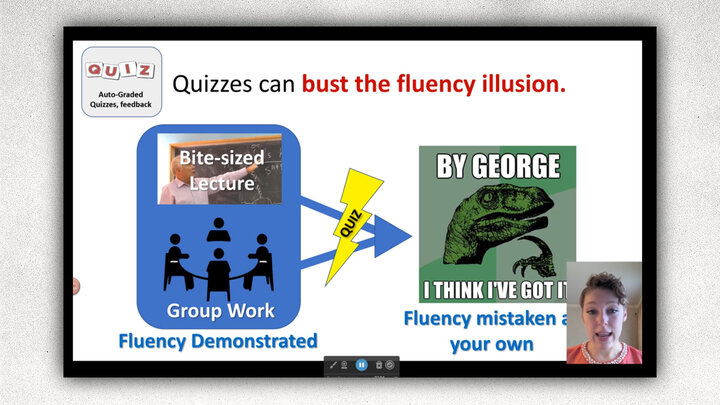For these sessions we make use of the AI Summary Notes available through Zoom which are then edited and shared with attendees. The session was recorded and is available on Yuja. Make use of the Yuja player index to jump to key points in the video.
Zoom AI Summary Notes (edited)
AI Teaching Projects Planning Meeting
Sydney welcomed attendees to the meeting, which was part of a series themed around teaching and learning projects involving AI, including bot support for learning. She mentioned that the October 24th and December 5th sessions would focus on specific areas, which would be determined during today's discussion. Sydney said she would record and planned to share recaps afterward.
Kelly Fund Grant Opportunity
Sydney introduced the Kelly Fund, a grant opportunity for teaching and learning projects, and shared a PDF link for more details. She noted the tight deadline of October 31 and mentioned she would follow up with the PDF in an email after the meeting. Nicholas inquired about the grant amount, which was listed as $75,000 to $100,000, and Sydney advised him to follow up for clarification as she could not confirm the exact amount.
Edit: Questions regarding the RFA and award management should be sent by email to: Kendra Schmid, kendraschmid@nebraska.edu. Access opportunity via NuRamp internal competitions.
OpenAI Teaching Impact Survey Plans
The meeting focused on the OpenAI Impact Teaching and Learning Projects, where Amy Barry (contact) provided an overview of the program, highlighting that 42% of applications were for teaching and learning purposes. She mentioned plans to distribute a survey to current users to demonstrate the program's impact and justify obtaining more licenses. Elizabeth Niehaus inquired about the extension of current licenses, which Amy confirmed would likely be renewed through October. Ilya Kravchenko expressed interest in joining the program and was advised to join the IT Tips mailing list for updates. Angie Rushman discussed using ChatGPT for student retention and engagement, as well as mapping non-academic learners, while Sydney inquired about experiences with generative AI in teaching, to which Ilya briefly responded.
ChatGPT in Academic Physics Teaching
Ilya shared his experiences using ChatGPT in academic settings, particularly in graduate-level physics courses. He described how he used ChatGPT to create engaging activities like a card game to help students understand complex physics concepts. Ilya also explained how he used ChatGPT to generate new quiz questions for his courses, improving assessment quality. Additionally, he discussed the challenges of using AI to assist with graduate students' literature review assignments, noting a colleague's success in creating a perfect paper without human input.
Generative AI in Academic Challenges
Sydney and Ilya discussed the challenges posed by generative AI in academic settings, particularly its ability to produce indistinguishable papers from those written by students, thereby undermining the significance of exams. Nicholas Husbye shared insights into his ongoing projects, combining an OpenAI initiative with an OER project focused on creating competency-based instructional modules for teacher preparation. He highlighted the use of AI as a co-designer, enhancing team collaboration, maintaining consistency, and improving instructional quality and accessibility. Sydney expressed interest in learning more about Nicholas's team workflows for future reference.
AI in Education: Challenges and Opportunities
Sydney and Elizabeth discussed their experiences with AI in education. Ilya shared his approach to teaching advanced graduate students to use AI as a core designer. Elizabeth described her summer course on AI in education for graduate students, focusing on both learning about AI and experimenting with it. She highlighted the students' varied experiences with AI, including using it for brainstorming, providing feedback, and writing papers, as well as the ethical and philosophical questions that arose. The discussion touched on the challenges of AI hallucinations, student discomfort with AI use, and the complex issues of intellectual ownership and creativity in AI-generated work.
AI in Education: Opportunities and Challenges
The group discussed future sessions for their learning community, with participants expressing interest in both deep dives into specific AI topics and broader project showcases. A significant portion of the conversation focused on the challenges and opportunities of incorporating AI into education, particularly addressing concerns about academic integrity and cheating. The participants explored strategies for using AI as a learning tool rather than a substitute for learning, with Nicholas sharing his experience of incorporating AI into assignments and requiring students to submit their chat histories. Sydney mentioned a recent blog post by Ethan Mollick, “On Working with Wizards,” about becoming connoisseurs of AI output and the need to develop instincts for judging when AI succeeds or fails.



